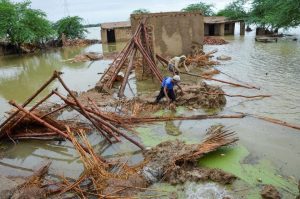Questioned is how flood victims are receiving relief.
BISP informed Senate panel that Rs70 billion had been distributed to flood-affected people without a new survey.

ISLAMABAD: According to information provided on Tuesday to the Senate Standing Committee on Poverty Alleviation and Social Security, Rs70 billion had been given out to flood victims without a fresh survey being taken.
Senator Naseebullah Bazai served as the meeting’s chairman in Parliament House, where the standing committee convened.
The Benazir Income Support Programme (BISPassistance )’s to flood victims, the issue of public importance raised by Senator Mushtaq Ahmed Khan at the Senate meeting on November 12, 2021 regarding the operation of the Pakistan Poverty Alleviation Fund, and the closure of Pakistan Baitul Mal funds in the Balochistan province were all thoroughly discussed during the meeting.
The gathering was fully informed about the assistance provided by the BISP to flood victims. For the assistance of the flood victims, Prime Minister Shehbaz Sharif had promised aid of Rs25,000 each family.
“2.8 million flood-affected families received Rs. 70 billion in aid.”
According to the information collected from NADRA, the BISP offered relief, and the relief effort was initiated on September 19, 2022.
The committee was informed that 78 districts across the nation, including 34 in Balochistan, 19 in Khyber-Pakhtunkhwa, 3 in Punjab, and 22 in Sindh, were devastated by the floods in 2022.
The standing committee was informed that help had been delivered to 2.41 million flood-affected families in Balochistan, 1.8 million in Sindh, and 300,000 in each of K-P and Punjab, but that many victims had not yet received it due to a shortage of funding.
Officials said that only Rs70 billion of the sought funding of Rs103 billion for help to flood-affected people had been granted.
The committee resolved that the matter will be further discussed in the next meeting while the relevant federal minister and the NDMA were present.
Senator Mushtaq stated during the meeting that the PPAF is a crucial organisation. Under the late Senator Usman Kakar’s leadership, a special committee was established in the Upper House. The committee travelled to the nation’s poorest regions and produced a thorough report, which found widespread poverty there.
“This institution has provided 17 billion rupees in interest-free loans to the nation. What are the date, sum, and rate of their return? How much money has been spent on education and health? What steps have been done to combat corruption, what plan has been developed to make such institutions non-political, and what percentage of poverty in the nation has been reduced as a result of the acts of this institution?
The CEO of PPAF informed the committee that funds from donors had replaced the organization’s low budget over the previous five years.
“The PPAF is working on rehabilitation, drinking water, and other welfare projects in 147 districts, and 95% of the loans issued are repaid. 1.8 million people have received assistance thus far.
It is preferable to assess the affairs of this institution in the minister’s presence, according to Senator Mushtaq.
The committee was informed that the high court would decide whether this institution should be classified as private or public. To obtain the judgement report as quickly as feasible, the committee members advised contacting the attorney general or the deputy attorney general. They emphasised that the status should also be established.
Amir Fida Paracha, managing director of Pakistan Baitul Mal, added that “many relief and humanitarian initiatives are having challenges” because this year’s budget of Rs6 billion is lower than the one of Rs6.5 billion from last year.
According to Paracha, the Pakistan Baitul Mal raised the budget for Balochistan’s health and education from Rs74 million to Rs99 million.
“The budget for preventing child labour has been increased from Rs49.6 million to Rs63 million, while the budget for empowering women in the province of Balochistan has been increased from Rs59 million to Rs101 million.”
The main issue, according to him, was that the previous administration had planned for shelters and shelter homes, guaranteeing an additional budget for them, while the finance ministry had also requested a $1 billion supplemental grant. He claimed that because it couldn’t be released, the organisation had to make sacrifices to its ongoing operations.









































